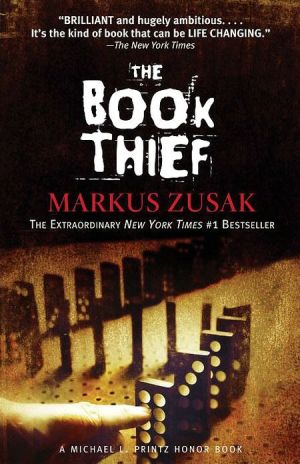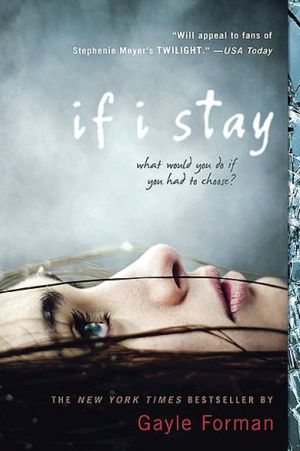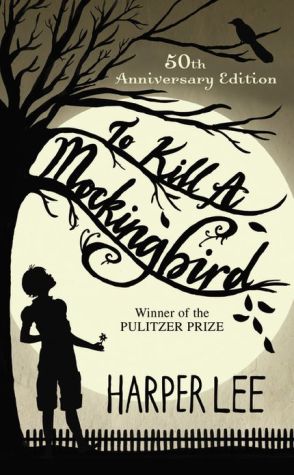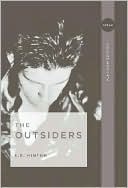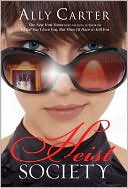The Book Thief
It’s just a small story really, about among other things: a girl, some words, an accordionist, some fanatical Germans, a Jewish fist-fighter, and quite a lot of thievery. . . .\ Set during World War II in Germany, Markus Zusak’s groundbreaking new novel is the story of Liesel Meminger, a foster girl living outside of Munich. Liesel scratches out a meager existence for herself by stealing when she encounters something she can’t resist–books. With the help of her accordion-playing foster...
Search in google:
An incredible young adult novel about how a young girl s love of books helps a community survive World War II and the Holocaust.It s just a small story really, about among other things: a girl, some words, an accordionist, some fanatical Germans, a Jewish fist-fighter, and quite a lot of thievery. Set during World War II in Germany, this groundbreaking novel is the story of Liesel Meminger, a foster girl living outside of Munich. Liesel scratches out a meager existence for herself by stealing when she encounters something she can t resist books. This is an unforgettable story about the ability of books to feed the soul. Zusak has created a work that deserves the attention of a sophisticated teen and adult readers a mesmerizing and original story. School Library Journal, starred review A tour de force to be not just read but inhabited. The Horn Book, starred reviewPublishers WeeklyCorduner uses considerable zeal and a talent for accents to navigate Zusak's compelling, challenging novel set in Nazi Germany. Death serves as knowing narrator for the tale, which is framed much like a lengthy flashback. The storytelling aspects of this structure include asides to the listener, and lots of foreshadowing about what eventually happens to the various lead characters-appealing features for listeners. But Corduner seems to most enjoy embracing the heart of things here-the rather small and ordinary saga of 10-year-old Liesel Meminger, who has been given over to a foster family following her mother's branding as a "Kommunist" and the death of her younger brother. Under her foster parents' care, she learns how to read, how to keep terrifying secrets and how to hone her skills as a book thief, a practice that keeps her sane and feeds her newfound love of words. With quick vocal strokes, Corduner paints vivid, provocative portraits of Germans and Jews under unfathomable duress and the ripple effect such circumstances have on their lives. Ages 12-up. (Oct.) Copyright 2006 Reed Business Information.
DEATH AND CHOCOLATE\ First the colors.\ Then the humans.\ That's usually how I see things.\ Or at least, how I try.\ ***HERE IS A SMALL FACT ***\ You are going to die.\ I am in all truthfulness attempting to be cheerful about this whole topic, though most people find themselves hindered in believing me, no matter my protestations. Please, trust me. I most definitely can be cheerful. I can be amiable. Agreeable. Affable. And that's only the A's. Just don't ask me to be nice. Nice has nothing to do with me.\ ***Reaction to the ***\ AFOREMENTIONED fact Does this worry you?\ I urge you—don't be afraid.\ I'm nothing if not fair.\ —Of course, an introduction.\ A beginning.\ Where are my manners?\ I could introduce myself properly, but it's not really necessary. You will know me well enough and soon enough, depending on a diverse range of variables. It suffices to say that at some point in time, I will be standing over you, as genially as possible. Your soul will be in my arms. A color will be perched on my shoulder. I will carry you gently away.\ At that moment, you will be lying there (I rarely find people standing up). You will be caked in your own body. There might be a discovery; a scream will dribble down the air. The only sound I'll hear after that will be my own breathing, and the sound of the smell, of my footsteps.\ The question is, what color will everything be at that moment when I come for you? What will the sky be saying?\ Personally, I like a chocolate-colored sky. Dark, dark chocolate. People say it suits me. I do, however, try to enjoy every color I see—the whole spectrum. A billion or so flavors, none of them quite the same, and a sky to slowly suck on. It takes the edge off the stress. It helps me relax.\ ***A SMALL THEORY ***\ People observe the colors of a day only at its beginnings and ends, but to me it's quite clear that a day merges through a multitude of shades and intonations, with each passing moment.\ A single hour can consist of thousands of different colors.\ Waxy yellows, cloud-spat blues. Murky darknesses.\ In my line of work, I make it a point to notice them.\ As I've been alluding to, my one saving grace is distraction. It keeps me sane. It helps me cope, considering the length of time I've been performing this job. The trouble is, who could ever replace me? Who could step in while I take a break in your stock-standard resort-style vacation destination, whether it be tropical or of the ski trip variety? The answer, of course, is nobody, which has prompted me to make a conscious, deliberate decision—to make distraction my vacation. Needless to say, I vacation in increments. In colors.\ Still, it's possible that you might be asking, why does he even need a vacation? What does he need distraction from?\ Which brings me to my next point.\ It's the leftover humans.\ The survivors.\ They're the ones I can't stand to look at, although on many occasions I still fail. I deliberately seek out the colors to keep my mind off them, but now and then, I witness the ones who are left behind, crumbling among the jigsaw puzzle of realization, despair, and surprise. They have punctured hearts. They have beaten lungs.\ Which in turn brings me to the subject I am telling you about tonight, or today, or whatever the hour and color. It's the story of one of those perpetual survivors—an expert at being left behind.\ It's just a small story really, about, among other things:\ * A girl\ * Some words\ * An accordionist\ * Some fanatical Germans\ * A Jewish fist fighter\ * And quite a lot of thievery\ I saw the book thief three times.\ BESIDE THE RAILWAY LINE\ First up is something white. Of the blinding kind.\ Some of you are most likely thinking that white is not really a color and all of that tired sort of nonsense. Well, I'm here to tell you that it is. White is without question a color, and personally, I don't think you want to argue with me.\ ***A REASSURING ANNOUNCEMENT ***\ Please, be calm, despite that previous threat.\ I am all bluster—\ I am not violent.\ I am not malicious.\ I am a result.\ Yes, it was white.\ It felt as though the whole globe was dressed in snow. Like it had pulled it on, the way you pull on a sweater. Next to the train line, footprints were sunken to their shins. Trees wore blankets of ice.\ As you might expect, someone had died.\ They couldn't just leave him on the ground. For now, it wasn't such a problem, but very soon, the track ahead would be cleared and the train would need to move on.\ There were two guards.\ There was one mother and her daughter.\ One corpse.\ The mother, the girl, and the corpse remained stubborn and silent.\ "Well, what else do you want me to do?"\ The guards were tall and short. The tall one always spoke first, though he was not in charge. He looked at the smaller, rounder one. The one with the juicy red face.\ "Well," was the response, "we can't just leave them like this, can we?"\ The tall one was losing patience. "Why not?"\ And the smaller one damn near exploded. He looked up at the tall one's chin and cried, "Spinnst du! Are you stupid?!" The abhorrence on his cheeks was growing thicker by the moment. His skin widened. "Come on," he said, traipsing over the snow. "We'll carry all three of them back on if we have to. We'll notify the next stop."\ As for me, I had already made the most elementary of mistakes. I can't explain to you the severity of my self-disappointment. Originally, I'd done everything right:\ I studied the blinding, white-snow sky who stood at the window of the moving train. I practically inhaled it, but still, I wavered. I buckled—I became interested. In the girl. Curiosity got the better of me, and I resigned myself to stay as long as my schedule allowed, and I watched.\ Twenty-three minutes later, when the train was stopped, I climbed out with them.\ A small soul was in my arms.\ I stood a little to the right.\ The dynamic train guard duo made their way back to the mother, the girl, and the small male corpse. I clearly remember that my breath was loud that day. I'm surprised the guards didn't notice me as they walked by. The world was sagging now, under the weight of all that snow.\ Perhaps ten meters to my left, the pale, empty-stomached girl was standing, frost-stricken.\ Her mouth jittered.\ Her cold arms were folded.\ Tears were frozen to the book thief's face.
\ From Barnes & NobleThe Barnes & Noble Review from Discover Great New Writers\ As one of our Discover readers said recently, "A good book is a good book," regardless of the audience for which it was written. In the spirit of that comment, we heartily recommend The Book Thief for readers of both the adult and teen persuasions.\ \ Australian-born Markus Zusak grew up sitting at the kitchen table, glued to his chair, listening to his mother's tales of her childhood in Nazi Germany. Such tales would later serve as a springboard for his unusual novel about the power of words to both destroy and comfort. A daring work in the adventurous spirit of The Shadow of the Wind, this novel has a bizarre narrator: Death. Drawn into a tense and dangerous historical era, readers discover how Liesel Meminger first learns to read and is transformed into the "book thief," stealing books before they can be burned by the Nazis or confiscated from personal libraries. When her family decides to hide a Jew in the basement, Liesel holds out hope to him in the form of her two most precious commodities: words and stories. (Summer 2006 Selection)\ \ \ \ \ Publishers WeeklyCorduner uses considerable zeal and a talent for accents to navigate Zusak's compelling, challenging novel set in Nazi Germany. Death serves as knowing narrator for the tale, which is framed much like a lengthy flashback. The storytelling aspects of this structure include asides to the listener, and lots of foreshadowing about what eventually happens to the various lead characters-appealing features for listeners. But Corduner seems to most enjoy embracing the heart of things here-the rather small and ordinary saga of 10-year-old Liesel Meminger, who has been given over to a foster family following her mother's branding as a "Kommunist" and the death of her younger brother. Under her foster parents' care, she learns how to read, how to keep terrifying secrets and how to hone her skills as a book thief, a practice that keeps her sane and feeds her newfound love of words. With quick vocal strokes, Corduner paints vivid, provocative portraits of Germans and Jews under unfathomable duress and the ripple effect such circumstances have on their lives. Ages 12-up. (Oct.) Copyright 2006 Reed Business Information.\ \ \ School Library JournalGr 9 Up\ With Death as narrator, Markus Zusak's haunting novel (Knopf, 2003) follows Liesel Meminger, The Book Thief, through the fear-filled years of Nazi Germany. The story opens as the ten-year-old girl takes her first book shortly after her younger brother's death. Both children were en route to the foster home of Hans and Rosa Hubermann in a Munich suburb. Despite Rosa's sharp tongue and Hans's lack of work, their home is a loving refuge for the nightmare-ridden girl. It also becomes a hideout for Max, a young Jewish man whose father saved Hans's life. Liesel finds solace with her neighbor Rudy and her creative partnership with Max. Accompanied by Rudy, the girl copes by stealing food from farmers and books from the mayor's wife. There are also good moments as she learns to read and plays soccer, but Hans's ill-advised act of kindness to a Jewish prisoner forces Max to leave their safe house. The failing war effort and bombing by the Allies lead to more sacrifices, a local suicide and, eventually, to great losses. Reading books and writing down her experiences save Liesel, but this novel clearly depicts the devastating effects of war. Narrator Allan Corduner defines each character with perfect timing. He's deliberate as the voice of Death, softly strong as Liesel, and impatient, but not unkind, as Rosa. With richly evocative imagery and compelling characters, Zusak explores behind-the-lines life in World War II Germany, showing the day-to-day heroism of ordinary people. Relevant for class discussions on wars both past and present.\ —Barbara WysockiCopyright 2006 Reed Business Information.\ \ \ \ \ \ Kirkus ReviewsWhen Death tells a story, you pay attention. Liesel Meminger is a young girl growing up outside of Munich in Nazi Germany, and Death tells her story as "an attempt-a flying jump of an attempt-to prove to me that you, and your human existence, are worth it." When her foster father helps her learn to read and she discovers the power of words, Liesel begins stealing books from Nazi book burnings and the mayor's wife's library. As she becomes a better reader, she becomes a writer, writing a book about her life in such a miserable time. Liesel's experiences move Death to say, "I am haunted by humans." How could the human race be "so ugly and so glorious" at the same time? This big, expansive novel is a leisurely working out of fate, of seemingly chance encounters and events that ultimately touch, like dominoes as they collide. The writing is elegant, philosophical and moving. Even at its length, it's a work to read slowly and savor. Beautiful and important. (Fiction. 12+)\ \
